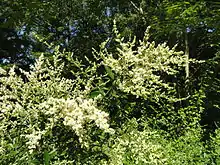Ligustrum quihoui
Ligustrum quihoui (waxyleaf privet, 小叶女贞 xiao ye nu zhen) is a shrub native to Korea and China (Anhui, Guizhou, Henan, Hubei, Jiangsu, Jiangxi, Shaanxi, Shandong, Sichuan, Xizang (Tibet), Yunnan, Zhejiang).[1] As with some other members of the genus, L. quihoui is cultivated as an ornamental in many places and has become naturalized and invasive in urban areas and scattered forested locales of the southeastern United States (Texas, Oklahoma, Alabama, Mississippi, Alabama, Florida, North Carolina, Virginia, Maryland).[2][3][4]
| Waxyleaf privet | |
|---|---|
 | |
| Scientific classification | |
| Kingdom: | Plantae |
| Clade: | Tracheophytes |
| Clade: | Angiosperms |
| Clade: | Eudicots |
| Clade: | Asterids |
| Order: | Lamiales |
| Family: | Oleaceae |
| Genus: | Ligustrum |
| Species: | L. quihoui |
| Binomial name | |
| Ligustrum quihoui Carrière | |
Ligustrum quihoui is a shrubby, semi-evergreen to evergreen privet, one to three meters high. It is noted for its large sparse flowering panicles of scented white flowers, borne late in the growing season, for which it is sometimes grown in gardens.[1][5]
Etymology
Ligustrum means 'binder'. It was named by Pliny and Virgil.[6]
Quihoui was named for M. Quihou, once superintendent of the Jardin d'Acclimatation in Paris.[7]
The Chinese name is 小叶女贞, pronounced 'xiao ye nu zhen', meaning 'lobed privet'.[8]
References
- Flora of China, Ligustrum quihoui
- USDA PLANTS Profile Ligustrum quihoui
- Biota of North America Program, Ligustrum quihoui
- Henderson State University, Arkadelphia Arkansas USA, Ligustrum quihoui Archived 2014-04-27 at the Wayback Machine
- Carrière, Élie Abel. 1869. Revue Horticole; résumé de tout ce qui parait d'intéressant en jardinage Paris 1869: 377. 1869, Ligustrum quihoui
- Gledhill, David (2008). "The Names of Plants". Cambridge University Press. ISBN 9780521866453 (hardback), ISBN 9780521685535 (paperback). p 237
- Trees and Shrubs - Ligustrum quihoui. [Online] Available at: http://treesandshrubsonline.org/articles/ligustrum_quihoui.php (Accessed 02/12/17)
- Flora of China via efloras.org. [Online] Available at: http://www.efloras.org/florataxon.aspx?flora_id=2&taxon_id=200017797 (Accessed 02/12/17)
External links
| Wikimedia Commons has media related to Ligustrum quihoui. |
- line drawing, Flora of China Illustrations vol. 15, fig. 257, 4-5
- Texas Invasives Database
- Le Jardin du Pic Vert (Domart su la Luce, Picardy, France), Troène de Chine, ligustrum quihoui
- Quackin' Grass Nursery (Brooklyn, Connecticut USA), Ligustrum quihoui
- Hopleys Plants Ltd. (Much Hadham, Hertfordshire, United Kingdom), Ligustrum quihoui
- Alibaba Xiamen Tarinto Imp. & Exp. Co., Ltd. (Hong Kong), Ligustrum quihoui carr arbusto